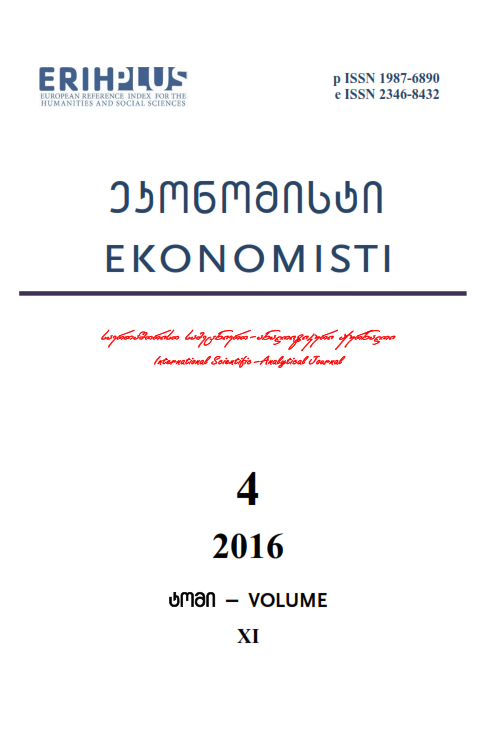
The international scientific and analytical, reviewed, printing and electronic journal of Paata Gugushvili Institute of Economics of Ivane Javakhishvili Tbilisi State University

Inclusive entrepreneurial development reform main directions in Georgia
10.36172/EKONOMISTI.2023.XIX.01.PAATA.KOGUASHVILI.DAVIT.MANUKELASHVILI
Expanded Summary
it is necessary to carry out a fundamentally different state policy, which will be focused on protecting the interests of the majority of the population of the regions, i.e. small and low-income farms, recognizing their priority role in the development of the country and creating such models of development that will open up all opportunities for the free development. None of the Georgian authorities, could solve this problem, directly connected with the solution of the exacerbated social problems, which largely became the reason for the low efficiency of their economic policy and, in general, the failure.
In the current conditions, without support, the existence of small farms in rural areas is possible only at a low technological level, which cannot ensure their development in any way. With state support and regulation, those functions are performed that are not provided by self-regulating market levers. State financing and regulation of agricultural cooperative systems are distinguished by complex structures and complex approaches defined normatively. The placement of budgetary funds in the agrarian sector on preferential terms and their control by the state is carried out within the framework of state targeted programs. The development and realization of these programs are carried out by the state based on complex approaches, which means that the project should cover the entire system of agricultural production in a particular direction.
To provide the rural population with credit resources, the formation of a cooperative agro-credit system is of particular importance. In developed economies, the main component of the cooperative agro-credit system is mainly represented as the cooperative agro-Credit Bank (CACB), although in some countries this system is created by credit unions and/or credit divisions of agricultural cooperatives. The cooperative agro Credit Bank is a targeted policy mechanism in the agrarian sector, the purpose of which is to increase the efficiency of labor and material resources of its members, which is achieved through preferential and simplified terms of lending, low-interest rates, joint responsibility, mutual trust and elimination of corruption manifestations, where the cooperative model of entrepreneurial activity and cooperative intra-production relations are a factor of lower risk when it comes to giving credits. Shareholders are well aware of each other's activities and, based on the principle of joint responsibility, exert pressure on so called bad borrowers. If the debt cannot be repaid by any shareholder, other members of the cooperative cannot receive additional credit.
.It is necessary to carry out a fundamentally different state policy, which will be focused on protecting the interests of the absolute majority of the population of the regions, i.e. small-scale and low-income farms, recognizing their priority role in the development of the country and creating such models of development that will open all opportunities for all the possibilities of free development.
The introduction of adequate and effective elements of the challenges in the system of state support and regulation will contribute to the effective institutional arrangement and will create a solid basis for overcoming the obstacles that hinder the transformation of the agrarian sector into an expanded system of diverse financial relations. Insufficient awareness of the fact that the development of rural cooperation in the current conditions is the most important direction of state reforms and transformations, and refraining from taking adequate effective measures in this regard and sharing the rich experience of successful economies, creates insurmountable problems that make economic and social development of rural population impossible.
The creation of a cooperative agro-credit system is necessary for providing credit for the entrepreneurial activities of the rural population. The development of the agricultural cooperation process is mainly determined by the coordinating body (agency) and the cooperative agro credit bank because in the current conditions only their organic tandem determines the expediency and successful functioning of each of them. Consequently, their existence separately lacks an objective basis.
In the current conditions, to choose the right path of economic development of the country, it is necessary to clearly and categorically define: when there are strong economic motives and especially models for the development of inclusive agro-enterprise activities that affect the improvement of socio-economic conditions of numerous members of the society, their ignorance or consideration in the rank of parity.
Keywords: inclusive, integration, cooperation, agro Credit Bank, paradigm, inequality, low-income, indic
